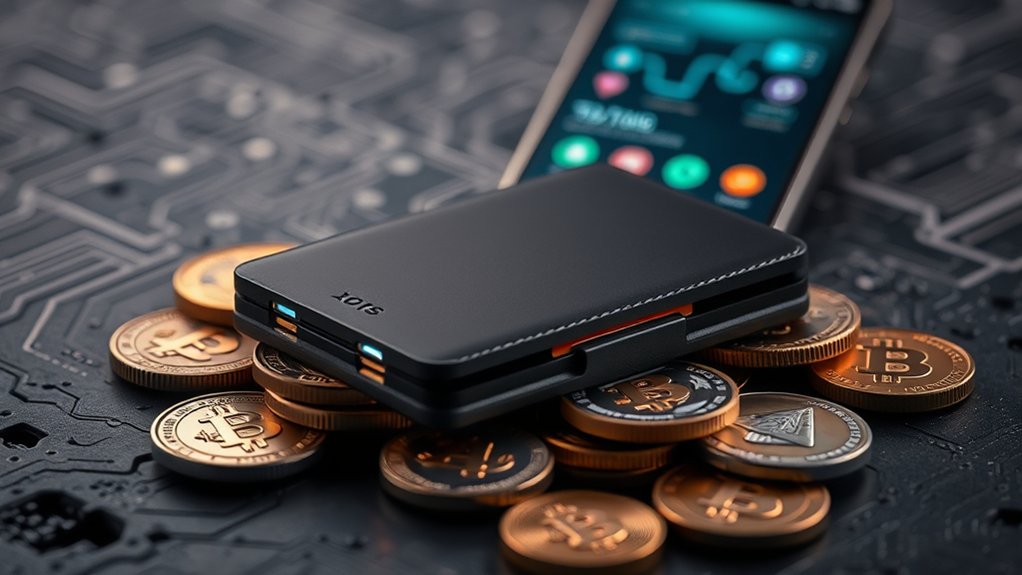A crypto wallet is basically your digital vault for cryptocurrencies. It connects you to the blockchain, letting you send, receive, and manage your coins. It's not a physical thing, just software or a hardware device. Your wallet holds public and private keys—which are essential for transactions. Lose your private key? Bye-bye funds. Hot wallets are convenient but risky; cold wallets are safe but a hassle. Want to know more about keeping your crypto secure? Let's dive deeper.

In the wild world of cryptocurrency, a crypto wallet is like a digital purse—except it won't hold your cash, and if you lose it, you might just lose your entire life savings. Think of it as a gateway to the blockchain. Wallets don't store your coins physically; they give you access to your funds on the blockchain.
There are two main types: software and hardware. Software wallets live on your computer or smartphone, while hardware wallets, like Ledger, are physical devices that keep your keys safe. Cryptocurrency wallets are designed for secure storage, allowing users to send, receive, and manage their digital currencies while maintaining control over their private keys.
These wallets house public and private keys, which are vital for transactions. When you send or receive crypto, your private key verifies the transaction. Lose that key? Well, good luck getting your money back. Public addresses are your go-to for receiving funds, but they're not exactly secret.
Wallets come in hot and cold varieties. Hot wallets are always online, making them super convenient but also a hacker's playground. Cold wallets, on the other hand, are offline and far safer, but less handy for quick transactions. While exchanges offer convenience and liquidity for trading, wallets prioritize security and control, making them ideal for long-term storage.
Why are crypto wallets important? For starters, they keep your cryptocurrency safe by managing those pesky private keys. They also allow you to send and receive crypto, maintain your balance, and even offer a touch of pseudonymity. Crypto wallets function as a means to hold and manage digital assets, combining features of bank accounts and email addresses for transactions. Additionally, wallet security is crucial, as it varies by type, with hardware wallets generally being the safest option.
But don't get too comfortable. There are risks. If you lose your private key, poof—there goes your money. Hot wallets are susceptible to hacking. And don't even get started on scams; phishing attempts are everywhere.
Not all wallets support every cryptocurrency, so choose wisely. Also, keep your wallet updated to fend off potential security breaches.
In short, a crypto wallet is fundamental to traversing the digital currency landscape, but it's not without its pitfalls. Handle with care.
Frequently Asked Questions
Can I Use Multiple Crypto Wallets Simultaneously?
Yes, multiple crypto wallets? Totally a thing. In fact, it's pretty smart. Security, organization, and diversification all rolled into one.
But wait—there's a catch. Managing several wallets can feel like herding cats. Keys everywhere, backups galore. It's a logistical nightmare!
Plus, hackers love a buffet. But hey, if someone wants to keep their assets safe, juggling a few wallets might just be the way to go. Just don't lose track of them!
Are Crypto Wallets Safe From Hacking?
Crypto wallets? Are they safe from hacking? Well, it depends.
Cold wallets? Pretty secure, since they're offline.
But software wallets? Yikes! They can be like leaving your front door wide open. Regular updates and strong passwords help, but if you're not careful, you might as well hand over your keys.
Public Wi-Fi? A hacker's playground.
What Happens if I Lose My Crypto Wallet?
Losing a crypto wallet? That's a disaster waiting to happen.
Forgotten passwords? Oops, too bad!
Lost private keys? Say goodbye to your Bitcoin—forever.
Sending funds to the wrong address? That's not just a mistake; it's a black hole.
And if the owner dies without sharing access? Good luck to the heirs.
The reality is harsh: loss is permanent, and recovery? Rarely successful.
Welcome to the wild world of cryptocurrency misfortunes.
Can I Convert My Crypto Wallet to Cash?
Yes, converting crypto to cash is totally doable.
You've got options: exchanges, P2P platforms, and even Bitcoin ATMs if you're feeling fancy. Just create an account, deposit your crypto, and sell it. Easy peasy, right?
But beware—transaction fees can bite, and market values swing like a pendulum. Plus, don't forget about pesky regulations and security. Keeping your assets safe is a must.
Do I Need a Wallet for Each Cryptocurrency?
No, you don't need a separate wallet for each cryptocurrency. Many wallets can juggle multiple coins like a circus act.
Sure, some are picky, only working with specific networks, but plenty of options exist. Wallet types vary too—software, hardware, you name it.
Just remember, managing multiple coins can be a bit of a headache. Don't skimp on security! A slip-up could cost more than you'd like to admit.





